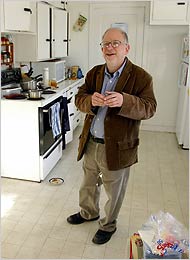Monday, February 05, 2007
Shawn etc
 Yesterday Newsday ran my review of Allen Shawn's Wish I Could Be There: Notes from a Phobic Life. The author's explication of phobia as a neurological phenomenon is mostly interesting but sometimes dutiful and a little dull. What saves the day are his intermingled memories of his family. Growing up at the elbow of editorial wizard and control freak William Shawn would have left its neurotic impress on almost any child. (The benign monarch of the New Yorker hated to leave the city and "looked surprised and vulnerable standing on grass and not on pavement. I believe that he found even the sight of mountains and forests somewhat disturbing.") Yet Shawn never indulges in Freudian finger-pointing--he writes about his family with affection and winning delicacy. I began this way:
Yesterday Newsday ran my review of Allen Shawn's Wish I Could Be There: Notes from a Phobic Life. The author's explication of phobia as a neurological phenomenon is mostly interesting but sometimes dutiful and a little dull. What saves the day are his intermingled memories of his family. Growing up at the elbow of editorial wizard and control freak William Shawn would have left its neurotic impress on almost any child. (The benign monarch of the New Yorker hated to leave the city and "looked surprised and vulnerable standing on grass and not on pavement. I believe that he found even the sight of mountains and forests somewhat disturbing.") Yet Shawn never indulges in Freudian finger-pointing--he writes about his family with affection and winning delicacy. I began this way:To fear is human. Even the healthiest mind is marbled with anxieties. And even the great conquerors, having sunk a fleet or put another city to the torch, will inevitably tremble in the privacy of their tents: as it happens, Alexander the Great, Julius Caesar and Napoleon were all frightened of cats. Yet there is fear--and there is phobia.You can read the rest here. Meanwhile, I also picked up Shawn's Arnold Schoenberg's Journey, wondering about the relationship between the two books. Yes, ladies and germs, Schoenberg had his phobic cross to bear: he was spooked by "the number thirteen (triskaidekaphobia), [and] regularly made mistakes in his musical scores when he came to the thirteenth page or thirteenth measure." Isn't there something poignant about the great progenitor of twelve-tone theory abhorring the number thirteen? I think so. Yet the figure who emerges from this beguiling little book is fearless--at least in the realm of art. Mahler and even Wagner had often strayed beyond the boundaries of the diatonic reservation. Schoenberg ditched them entirely. For this he suffered. Shawn quotes a vivid statement that composer made in 1947:
Allen Shawn, a composer and the author of a previous study of the composer Arnold Schoenberg, would be the first to recognize this distinction. In the opening pages of Wish I Could Be There, he's engagingly frank about his phobias, which are so numerous and overlapping as to constitute a kind of neurological obstacle course.
A boiling ocean--not good. Yet Schoenberg has always been thrashing or dog-paddling his way through something even more forbidding: his reputation. This is what Shawn means to rescue him from. He wants us to hear the warmth and intricacy of Schoenberg's music, its all-too-human register of sadness, joy, bewilderment. And for me, anyway, he succeeds, since I went right back Verklärte Nacht (the Sony release by the Juilliard String Quartet with Walter Trampler and Yo-Yo Ma) and the piano pieces recorded for Naxos by Peter Hill. These are earlier pieces, of course. Schoenberg is still puttering along on diatonic training wheels, at least in the string sextet, but the music is absolutely magical. When Randall Jarrell sent his wife-to-be a copy in 1951, he wrote: "I am about to mail you some Moonlight marked Fragile.""Personally I had the feeling as if I had fallen into an ocean of boiling water, and not knowing how to swim or get out in another manner, I tried with my legs and arms as best I could. I did not know what saved me; why I was not drowned or cooked alive. I have perhaps only one merit: I never gave up. But how could I give up in the middle of an ocean?"
I suppose you could apply the same phrase to Six Little Piano Pieces, which Shawn discusses in his introduction. The author first tackled the tiny suite at age 13, egged on by his piano teacher Frances Dillon. "This attractively thin album of miniatures seemed to contain a special, intimate, and yet strangely familiar world," he writes. "As in a Japanese rock garden, the pieces altered one's conventional sense of scale in a way that made each musical moment in them appear huge." These quizzical and elusive pieces go by in a flash. Peter Hill, for example, dispatches all six in 5:49. Yet they never sound rushed, and the lengthiest piece--the last, clocking in at an expansive 1:39--feels much, much longer. Time stands still, or at least jiggles quietly on one foot.

